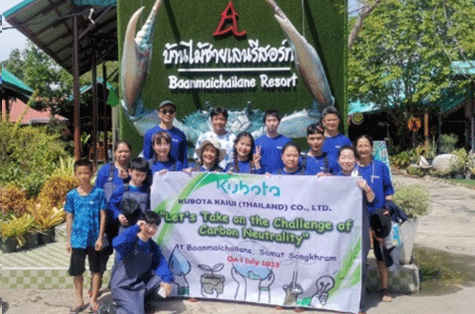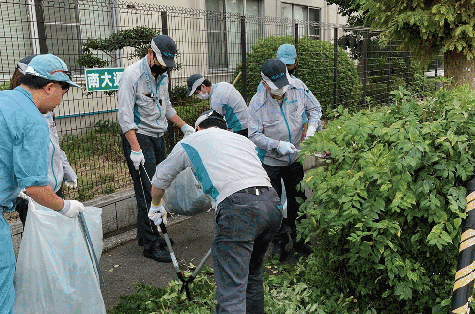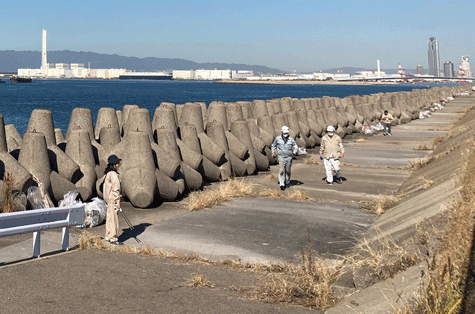Conserving Biodiversity
Our corporate activities rely on various ecosystem services, which are provided by natural capital comprising soil, air, water, animals and plants, and other elements. Meanwhile, biodiversity is facing various crises in different locations worldwide, therefore corporations are required to do their part in protecting biodiversity and making sustainable use of ecosystem services.
The Kubota Group sees conserving biodiversity as one of its materiality issues. In its corporate activities, provision of products and services, and social contribution initiatives, in view of an impact on natural capital, the Group is endeavoring to ensure that care is taken to conserve biodiversity and protect the natural environment.
Taking this into account and beginning with our Medium-Term Environmental Conservation Targets 2025, we have started establishing targets for biodiversity conservation activities in accordance with the characteristics and business operations of each site. We are currently monitoring the progress of these activities.
- Activities towards achieving SDGs
- Approach to Conserving Biodiversity and Natural Capital
- Relationship with Biodiversity
- Conservation of Biodiversity around Business Sites
- Promoting Social Contribution Activities
- Promoting Continuous Conservation Activities
Activities towards achieving SDGs
| Related SDGs and targets |
 |
|---|---|
| Major Activity Content |
|
| 2025 Activity Targets (KPIs) |
|
Approach to Conserving Biodiversity and Natural Capital
The Kubota Group has set Conserving Biodiversity as one of the five basic items for environmental conservation. In December 2009, we incorporated corporate activities that consider biodiversity into the Kubota Group Environmental Action Guidelines. Then, in our Eco-First Commitment which was renewed in 2021, we also included a commitment to promoting activities for conserving biodiversity.
- Approach to Conserving Biodiversity
-
The Kubota Group has included Conserving Biodiversity as one of the five basic items for environmental conservation. In its corporate activities, provision of products and services, and social contribution initiatives, in view of its impact on natural capital, the Group will endeavor to ensure that care is taken to conserve biodiversity and protect the natural environment.
- [Major Initiatives]
-
- Corporate activities
- At the design and development stage, we conduct product environmental assessments to evaluate the impact on natural capital.
- At the procurement stage, we present our Green Procurement Guidelines to our suppliers and require them to give consideration for biodiversity.
- At the production and logistics stages, we strive to reduce the environmental loads and environmental risks associated with operations at our sites and transport of materials.
- As part of our environmental management, we conduct environmental education and awareness-raising for employees to foster their recognition of the value of biodiversity and the importance of conservation activities.
- Our environmental communication initiatives include efforts to disseminate information about our biodiversity conservation activities.
- Provision of products and services
- By providing products and services with less environmental loads through fuel efficiency and exhaust gas purification, for example, we are striving to lessen our impact on biodiversity.
- By providing water environment solutions such as wastewater treatment and waste treatment, we contribute to improving the ecosystems and nurturing environment for plants and animals.
- By providing products and services that contribute to urban infrastructure development that considers smart agriculture and the environment, we contribute to sustainable use of ecosystem services.
- We endeavor to provide products and services that contribute to improving crop yields to suppress deforestation.
- Social contribution activities
- Through our social contribution activity the Kubota e-Project supporting reclamation of abandoned farmland and conservation activities in rural and forest areas, we are promoting protection of the natural environment.
- We are promoting the beautification and greening of business sites and neighborhoods as well as protection of plants and animals.
- Corporate activities
Evaluating our Relationship with Biodiversity
According to the World Economic Forum, the loss of biodiversity currently ranks alongside climate change-related risks as one of the most severe global risks. Corporations are being urged to take action to mitigate and reverse the loss of biodiversity, or in other words, transition to a “nature-positive” approach to their business activities. In these circumstances, a number of international initiatives and frameworks are being developed, one of which is the Taskforce on Nature-related Financial Disclosures (TNFD). The recommendations of the TNFD—released in September 2023—call on companies to identify the scope of their corporate activities, to evaluate what kind of biodiversity and natural capital their business activities are dependent upon in each region, as well as the impacts thereof, and to analyze how those impacts represent risks and opportunities for their initiatives.
The chart below shows an overall picture of how the Kubota Group’s corporate and social contribution activities are related to biodiversity.
Conservation of Biodiversity around Business Sites
In FY2023, we undertook social contribution activities through biotope conservation inside our business sites and clean-up and greening of areas around sites. We also maintained environments for various living organisms and promoted protection of the natural environment and conservation of biodiversity.
-
Installation of Insect Hotels

We installed insect hotels on the grounds of Kubota Farm Machinery Europe S.A.S (France) in an effort to protect biodiversity.
-
Installation of Biotopes

At Siam Kubota Corporation Co., Ltd. (Thailand), we installed a biotope on site to conserve biodiversity.
-
Mangrove Planting

The employees of Kubota Procurement & Trading (Thailand) Co., Ltd., along with their family members, volunteered to expand a green tract of land by planting mangroves. Mangroves help protect biodiversity by preventing coastal erosion.
-
Beekeeping

At Kverneland Group Nieuw-Vennep BV (Netherlands), we installed beehives within the factory grounds. More hives were added with the help of an expert beekeeper, so there are now four hives in total.
-
Releasing Young Fish

At Siam Kubota Metal Technology Co., Ltd. (Thailand), we collaborated with the local government and companies to release juvenile fish.
-
Rooftop Greening of Bicycle Parking Area

At the Kubota Hirakata Plant (Japan), we established a green space on the rooftop of the enclosed bicycle parking area as a way of greening the premises.
Promoting Social Contribution Activities
The Kubota Group conducts annual beautification activities in areas around its sites to pick up litter, which may become a source of marine plastic pollution.
-
Clean-Up Activities around Sites

At the Kubota Sakai-Mihara Plant (Japan), we carried out cleaning activities along the sidewalks around the company, removing weeds and pruning shrubs.
-

The Kubota Global Institute of Technology (Japan) conducted beautification activities as a part of the joint campaign with Osaka Prefecture.
Promoting Continuous Conservation Activities
Our Medium-Term Environmental Conservation Targets 2025 include conservation of biodiversity. Our initiatives for this include continuously promoting greening of the inside of our business sites and social contribution activities. Furthermore, the Kubota Group has wide-ranging involvement with biodiversity, from the environmental impacts of its production activities at business sites to the impact of products and services used by customers.
We report to the Executive Officers' Meeting on energy consumption and emissions of CO2, waste, water, and chemicals, etc. at our production sites, as well as the status of progress on reduction measures at each site. The impact of climate change and its potential for causing biodiversity loss has also been pointed out, and we have now revised our target values for CO2 emission reductions in 2030 to achieve even greater reductions.
As an initiative to reduce the use of chemical fertilizers on farms, we are working to promote the spread of farm management using the Kubota Smart Agri System (KSAS) along with agriculture drones and combine harvesters fitted with sensors. Through efficient use and distribution of agrochemicals and fertilizer, we will reduce the impact of chemicals on the environment and contribute to conservation of biodiversity.
